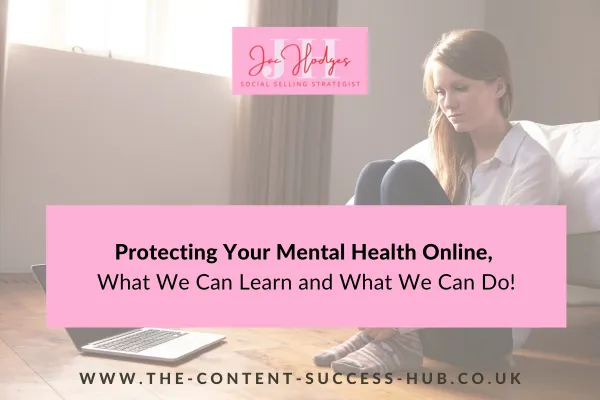
Protecting Your Mental Health Online, What We Can Learn and What We Can Do!
Introduction:
The Caroline Flack documentary was a hard watch. Heartbreaking, confronting, and a brutal reminder of something we don’t talk about enough…
The online world can affect your mental health far more than you realise.
We’re all encouraged to “show up”, “be visible”, “post consistently”, and “grow an audience”.
But rarely are we reminded of the flip side:
Your mental wellbeing comes first. Always.
Whether you’re an adult navigating the online world or a parent raising a child in it, you need boundaries, awareness, and protection. Because social media doesn’t come with a manual, but the consequences can be very real.
Here’s how to protect your mental health online, with practical tips you can use today.
1. Be Honest About How Social Media Makes You Feel
Scrolling isn’t neutral. It shapes your mood, triggers your insecurities, and impacts your self-worth.
Most of us don’t even notice it happening.
Ask yourself:
Do you come off social media feeling heavier, anxious, or deflated?
Do certain accounts trigger comparison?
Does engagement (or lack of it) affect how you feel about yourself?
For adults: If someone’s posts make you feel small, insecure, or irritated, mute or unfollow.
You don’t owe anyone access to your mind.
For parents: Ask your children how they feel before and after being online.
Help them notice emotional shifts so they don’t normalise negative feelings as “just how it is”.
2. Remember: You Control Who You’re Connected To
This is your reminder that you are in charge of your online world.
You control your following list. Your connections. Your inbox. Your environment.
If someone drains you, triggers you, or brings negativity into your day, you are allowed to step away.
Walk away from online relationships that don’t serve your wellbeing.
For adults:
Clean your list regularly. Remove negativity without guilt.
For parents:
Teach kids early that unfollowing, muting, or blocking is not rude -
it’s healthy self-protection.
3. Don’t Fall Into the Comparison Trap
One of the biggest threats to mental health is comparison.
It’s easy to feel like everyone else is further ahead, more successful, better looking, more organised, or happier than you are.
But here’s the truth no one says loudly enough:
You’re comparing your real life to someone else’s edited highlight reel.
And with AI now in the mix, so much of what you see isn’t even real.
Airbrushed faces, perfect homes, flawless days - often completely manufactured.
Don’t let illusions damage your self-belief.
For kids:
Show them examples of AI-altered images so they understand how easily things can be manipulated.
Help them see the difference between online perfection and real life.
4. Boundaries Are Not Optional
Social media is loud. Busy. Overstimulating.
Without boundaries, it will drain your emotional energy.
For adults:
Turn off notifications after a certain time
Set “no social” mornings or evenings
Protect weekends or family days
Don’t reply instantly
And remember: you are not available on demand
For parents:
Model the behaviour.
Tech-free zones or digital downtime work best when adults participate too.
5. Teach Yourself (and Your Kids) to Spot Toxic Behaviour
Not all harm is obvious.
Some toxicity is subtle: sarcasm, gossip accounts, comments disguised as “banter”, passive-aggressive DMs.
The documentary highlighted how deeply online cruelty can cut.
For adults:
Block, delete, restrict. And don’t explain your decisions to anyone.
For parents:
Teach the difference between teasing, conflict, and bullying.
If you wouldn’t say it to someone’s face - it shouldn’t be typed.
6. Curate Your Feed Like Your Home
You decide who gets in.
Your feed should feel safe, inspiring, calming, or educational - not triggering or chaotic.
For adults:
Do a cleanse. Keep what lifts you. Remove what doesn’t.
For parents:
Go through your child’s following list together.
Empower, don’t police.
Help them choose accounts that support positivity and creativity.
7. Take Real Breaks
Social media will still be there.
Your wellbeing cannot wait.
For adults:
Build in offline days or afternoons.
Swap the scroll for something grounding.
For parents:
Create screen-light days that focus on connection, not punishment.
Normalise unplugging.
8. Talk About It
The documentary showed what can happen when people feel alone in their struggles.
Talking about mental health isn’t weakness - it’s strength.
Whether you’re overwhelmed, anxious, or dealing with online pressure… speak up.
And if you’re a parent, create a home where your child feels safe to say, “I’m struggling.”
Conclusion
The online world holds incredible opportunity, but it also demands responsibility.
Protecting your mental health isn’t about avoiding social media - it’s about navigating it intentionally, safely, and with boundaries.
Look after yourself.
Teach your children to look after themselves.
And remember:
You don’t have to consume everything you see.
You don’t have to stay connected to everyone you follow.
You don’t have to absorb every comment, message, or story.
Be the filter, not the sponge.
Choose what deserves space in your world.
